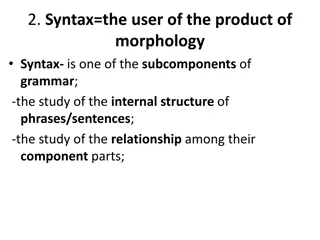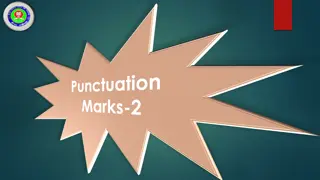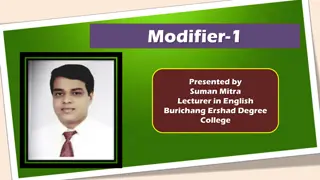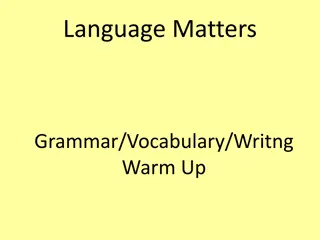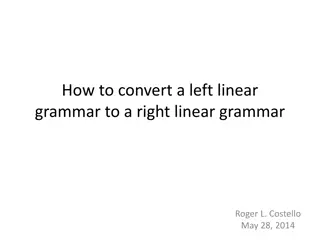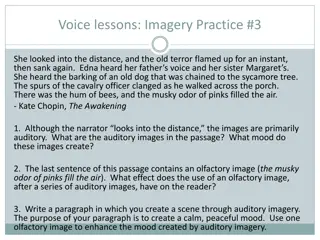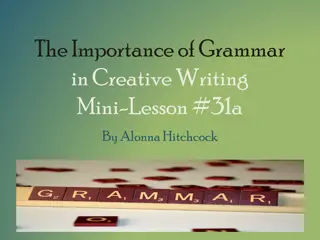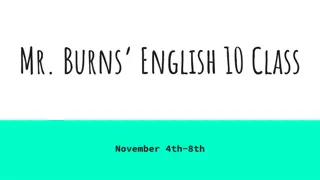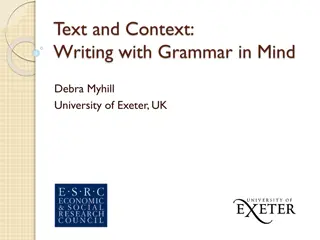Understanding Appositives in Grammar
Appositives are noun phrases that rename other nouns in a sentence. They add information or provide clarification about the main subject. Learn how appositives differ from adjectivals, when to use commas with appositives, and how colons and dashes can be used to emphasize appositives in writing.
Download Presentation

Please find below an Image/Link to download the presentation.
The content on the website is provided AS IS for your information and personal use only. It may not be sold, licensed, or shared on other websites without obtaining consent from the author. Download presentation by click this link. If you encounter any issues during the download, it is possible that the publisher has removed the file from their server.
E N D
Presentation Transcript
CHOOSING NOMINALS
Appositives Appositives may look like adjectivals as they add modifications, but the main difference is: An appositive actually renames the noun phrase! Egs. Tim, the deli manager at Giant Foods, used to own a restaurant. Jack London s novel The Call of the Wild was serialized in The Saturday Evening Post in the summer of 1903.
The relationship between the appositive and the noun it renames is like the relationship between the two NP positions in Pattern 2 sentences: Something is something E.g. Tim, the deli manager at Giant Foods, used to own a restaurant. Tim is the deli manager at Giant Foods. Jack London s novel The Call of the Wild was serialized in The Saturday Evening Post in the summer of 1903. Jack London s novel is The Call of the Wild.
How do we use commas for appositives? It is similar to relative clause (restrictive or nonrestrictive). Our friend Blane drives a snazzy red Miata. (restricted: we may have more than one friend) The judge s husband, Morrie, stays home with the kids. (nonrestricted: judge must have only one husband!)
One important thing to remember: Not all appositives are noun phrases!! E.g. This role for the comma, to shift the peak of stress, is probably one you hadn t thought about before. Appositives are nominals in function, but verb forms can even be appositives
Colon and Dashes with Appositives Colon can be used to connect compound sentences Most of the buildings in the town were high: Some rose to eighty feet. Colon can also be used as a signal for appositives (puts emphasis) I ll never forget the birthday present my dad bought me when I was ten: a new three-speed bike. This can also be written with a dash (informal colon) I ll never forget the birthday present my dad bought me when I was ten a new three-speed bike. If you don t want to put emphasis, use a comma instead
One of the most common uses of the colon is to signal a list: Three committess were set up to plan the convention: program, finance, and local arrangements. Sometimes the separate structures in the list have internal punctuations of their own. In that case, you need to separate them with semicolons: The study of our grammar system includes three areas: phonology, the study of sounds; morphology, the study of meaningful combinations of sounds; and syntax, the study of sentence structure.
When an appositive series is in the middle of the sentence, we use a pair of dashes to set it off: Three committees program, finance, and local arrangements were set up to plan the convention. All three areas of our grammar system phonology, morphology, and syntax will be covered in the grammar course. In these sentences, if we had used commas instead of dashes, the reader might have been confused: All three areas of our grammar system, phonology, morphology, and syntax, will be covered in the grammar course.
Avoiding punctuation errors There is a simple rule to follow for the use of the colon with appositives: The colon that introduces an appositive is preceded by a complete independent clause. The colons in the following sentences are INCORRECT because the parts preceding the colon are not full sentences: The committees that were set up to plan the convention are: program, finance, and local arrangements. The three areas of the grammar system are: phonology, morphology, and syntax.
It is possible to use the following to avoid such mistakes: The committees that were set up to plan the convention are the following: program, finance, and local arrangements. However, in this sentence the focus is on the following , so the best version of this sentence can be Three committees were set up to plan the convention: program, finance, and local arrangements.
Exercise for Appositives Use appositives to combine the following sentences. Insert any necessary colons, dashes, or semicolons. 1. Families chose their three favorite board games. They listed Monopoly, Scrabble, and Trivial Pursuit. 1. Families chose their three favorite board games: Monopoly, Scrabble, and Trivial Pursuit. 2. Many languages are spoken in the United States. The top four are English, Spanish, Chinese, and French. 2. The top four languages that are spoken in the United States are as follows: English, Spanish, Chinese, and French.
3. Three states have over thirty electoral votes. California has fifty-five, Texas has thirty-two, and New York has thirty- one. 3. Three states have over thirty electoral votes: California, fifty-five; Texas, thirty- two; and New York, thirty-one. 4. The Big Three at the Yalta Conference in 1945 were Franklin D. Roosevelt, Winston Churchill, and Joseph Stalin. Franklin D. Roosevelt was the president of the United States. Winston Churchill was the prime minister of Great Britain. Joseph Stalin was the general secretary of the Soviet Union 4. The Big Three at the Yalta Conference in 1945 were are the following: Franklin D. Roosevelt, the president of the United States; Winston Churchill, the prime minister of Great Britain; and Joseph Stalin, the general secretary of the Soviet Union.
Sentence Appositives Instead of simply renaming a noun, sentence appositives offer a conclusion about the sentence as a whole in the form of a noun phrase (very similar to broad reference of which): The musical opened to rave reviews and standing-room-only crowds a smashing success. A pair of cardinals has set up housekeeping in our pine tree an unexpected welcome event. In August of 2005 Hurricane Katrina hit the Gulf Coast with winds that clocked 150 mph the worst natural disaster in the nation s history in over 100 years.
NOMINAL VERB PHRASES Gerunds: Look at this participial phrase Going through airport security, the travelers do not look happy. How is this different from the following sentence? Going through airport security takes the fun out of air travel -ing form as a nominal Going through airport security takes the fun out of air travel IT
Gerunds can fill all the NP positions in the sentence: As subject complement The worst part of the security system is taking off your shoes. As direct object I enjoy jogging early in the morning As object of preposition My biology professor often begins class by telling weird jokes. As appositive My dad s hobby, collecting stamps, can be time consuming.
The Subject of the Gerund: Subject generally does not appear in gerund: Jogging is good exercise. (who is jogging?) Raising orchids requires patience. (who is raising?) If the subject of the gerund appears, then it is in the possessive case: I objected to their arriving in the middle of the meeting. My objecting didn t make any difference. There is no point in your coming if you re going to be so late.
Even if it is a persons name, it is possessive: I was surprised at Terry s refusing the job offer. However, if the subject is compound, the possessive is generally not used: I was surprised at Bill and Terry turning down that beautiful apartment. But a more natural way of saying this is as follows: I was surprised when Bill and Terry turned down that beautiful apartment.
Infinitives: Infinitives can also function as nominals (like gerunds) Remaining neutral on this issue is unconscionable. To remain neutral on this isse is unconscionable. Like gerunds, infinitives can function in all NP positions: Direct object My cousin wants to be a farmer Subject complement His ambition is to raise organic vegetables. Appositive My sister achieved her goal: to graduate in three years.
NOMINAL CLAUSES They are the clauses that start with that I suspect that our history exam will be tough. The president recently announced that he will ask Congress for tax cuts for the middle class. In these sentences, a complete sentence becomes the object of another sentence. Our history exam will be tough. He will ask Congress for tax cuts for the middle class.
Nominal clauses can also be in the subject position That the common cold is caused by a virus has been clearly established by science. Sometimes we don t even need that (if in object position) I suspect our history exam will be tough. Derek said he would be late. Make sure it doesn t cause a confusion Last week I suspected my friend Kim, who never goes to class, was getting into academic trouble. The reader might get confused (Is my friend, Kim the subject or the object?)
If that is in the subject position, it cannot be omitted. The common cold is caused by a virus (that) has been clearly established by science. Nominal clauses can also be used for interrogatives: I wonder why the students are protesting. Who will be at the party remains a mystery. (Unlike that interrogatives cannot be omitted) Can also be used as objects of prepositions and appositives: The boy was curious about what was in the box. (Obj of Prep) The students questions, why the summer schedule was changed, has not been answered. (App)
Nominals as delayed subjects: In spoken language nominals as subjects are prefered to be delayed: Instead of saying That the common cold is caused by a virus has been clearly established. We prefer to say It has been clearly established that the common cold is caused by a virus. We do the same for infinitives Instead of saying To remain neutral on this issue is unconscionable. We prefer to say It is unconscionable to remain neutral on this issue.
Exercise for nominal clauses Underline the nominal clauses in the following sentences. Identify the function that each performs in its sentence. 1. The neighbors never suspected that we had a pet boa constrictor in our house. 1. The neighbors never suspected that we had a pet boa constrictor in our house. (direct object) 2. The guest speaker s e-mail message informed us when he would arrive. 2. The guest speaker s e-mail message informed us when he would arrive. (indirect object)
3. That the term First Lady wasnt used until 1849 is a little-known fact. 3. That the term First Lady wasn t used until 1849 is a little-known fact. (Subject) 4. When I saw the exam questions, I realized I had studied the wrong chapters. 4. When I saw the exam questions, I realized I had studied the wrong chapters. (direct object)
5. The suggestion that we reform our spelling system had little support. 5. The suggestion that we reform our spelling system had little support. (Appositive) 6. Why reality shows are so popular mystified the whole staff 6. Why reality shows are so popular mystified the whole staff (Subject)
General Revision of Nominals 1. Why is the appositive set off with commas in the second of these two sentences? Mark s brother George coaches basketball in Indiana. Mark s brother, George, coaches basketball in Indiana. Which sentence tells you that Mark has only one brother? Which sentence implies that Mark has more than one brother? Why does the following sentence need commas? The senator s husband, Reuben, accompanied her to Washington
2. Consider the differences in meaning in these two pairs of sentences. How do you account for these differences? Do the differences involve different sentence patterns? Mel stopped to talk to Walt. Mel stopped talking to Walt. Mel started talking to Walt. Mel started to talk to Walt. 3. Explain the ambiguity of these sentences: Flying planes can be dangerous. I don t like burping babies.




